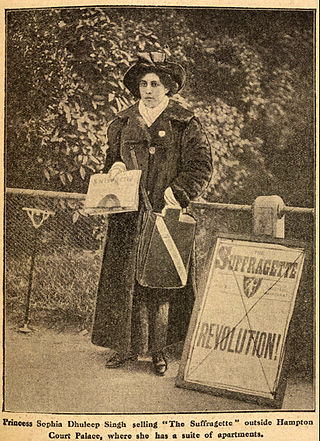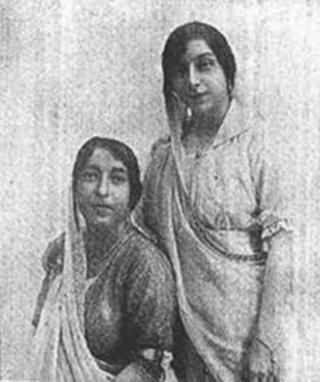
Sarojini Naidu was an Indian political activist and poet who served as the first Governor of United Provinces, after India's independence. She played an important role in the Indian independence movement against the British Raj. She was the first Indian woman to be president of the Indian National Congress and appointed as governor of a state.

Cornelia Sorabji was an Indian lawyer, social reformer and writer. She was the first female graduate from Bombay University, and the first woman to study law at Oxford University. Returning to India after her studies at Oxford, Sorabji became involved in social and advisory work on behalf of the purdahnashins, women who were forbidden to communicate with the outside male world, but she was unable to defend them in court since, as a woman, she did not hold professional standing in the Indian legal system. Hoping to remedy this, Sorabji presented herself for the LLB examination of Bombay University in 1897 and the pleader's examination of Allahabad High Court in 1899. She became the first female advocate in India but would not be recognised as a barrister until the law which barred women from practising was changed in 1923.

Princess Sophia Alexandrovna Duleep Singh was a prominent suffragette in the United Kingdom. Her father was Maharaja Sir Duleep Singh, who had lost his Sikh Empire to the Punjab Province of British India and was subsequently exiled to England. Sophia's mother was Bamba Müller, who was half German and half Ethiopian, and her godmother was Queen Victoria. She had four sisters, including two half-sisters, and three brothers. She lived at Hampton Court Palace in an apartment in Faraday House given to her by Queen Victoria as a grace-and-favour home.

Elleke Boehmer, FRSL, FRHistS is Professor of World Literature in English at the University of Oxford, and a Professorial Governing Body Fellow at Wolfson College. She is an acclaimed novelist and a founding figure in the field of Postcolonial Studies, internationally recognised for her research in colonial and postcolonial literature and theory. Her main areas of interest include the literature of empire and resistance to empire; sub-Saharan African and South Asian literatures; modernism; migration and diaspora; feminism, masculinity, and identity; nationalism; terrorism; J. M. Coetzee, Katherine Mansfield, and Nelson Mandela; and life writing.
South Asians in the United Kingdom have been present in the country since the 17th century, with significant migration occurring in the mid-20th century. They originate primarily from eight sovereign states in South Asia which are, in alphabetical order, the countries of Afghanistan, Bangladesh, Bhutan, India, Nepal, Pakistan, and Sri Lanka. There is also a history of migration of diasporic South Asians from Africa and Southeast Asia moving to, and settling in, the United Kingdom.

Sir William Lee-Warner was a British author and colonial administrator in the Indian Civil Service. He was Chief Commissioner of Coorg in 1895. In 1907 he headed the eponymous Lee Warner Committee that examined Indians receiving education in Britain.
Shalva Weil is a senior researcher at The Seymour Fox School of Education at the Hebrew University of Jerusalem, Israel. In 2017, she was GIAN Distinguished Professor at Jawaharlal Nehru University, in New Delhi. She has researched Indian Jews, Ethiopian Jews, and the Ten Lost Tribes and specializes in femicide, qualitative methods, violence, ethnicity, education, religion, and migration.
Brijalal Nehru was a noted civil servant and member of the Nehru family.

Millicent Hughes Mackenzie was a British professor of education at University College of South Wales and Monmouthshire, the first female professor in Wales and the first appointed to a fully chartered university in the United Kingdom. She wrote on the philosophy of education, founded the Cardiff Suffragette branch, became the only woman candidate in Wales in the 1918 general election, and was a key initiator of Steiner-Waldorf education in the United Kingdom.

British Punjabis are citizens or residents of the United Kingdom whose heritage originates wholly or partly in the Punjab, a region in the Indian subcontinent, which is divided between India and Pakistan. Numbering 700,000 in 2006, Punjabis represent the largest ethnicity among British Asians. They are a major sub-group of the British-Indian and British Pakistani communities.
Ayub Ali Master, was an early British Bangladeshi social reformer, politician and entrepreneur. He is notable for pioneering social welfare work for many early British Asians. He established a boardinghouse known as "Number 13" in his home which provided many facilities for British Asians. He is one of the earliest of Sylhetis to arrive in the United Kingdom, now hosting one of the largest Bangladeshi diaspora communities outside of Bangladesh and due to this, he was amongst the famous household names in the Sylhet region during his time referred to as the brave jahazis (sailors). His family is also notable as entrepreneurs and businessmen.
Shah Abdul Majid Qureshi, also known by his daak naam Moina Meah, was an early British Bangladeshi restaurateur and social reformer. He is notable for being involved in the early politics of British Asians and pioneering social welfare work for the working-class diaspora in the United Kingdom. He claimed to be the first Sylheti to own a restaurant in the United Kingdom. One of his later restaurants, India Centre, often provided facilities and was a location where important meetings were held by the India League attracting the likes of Subhas Chandra Bose and V. K. Krishna Menon.

Herabai Tata (1879–1941) was an Indian women's rights activist and suffragist. Married in 1895, Tata's husband was progressive and supported the education of his wife and daughter, hiring tutors to help her with her schooling. In 1909, Tata, who was Parsi, developed an interest in Theosophy and within a few years made the acquaintance of Annie Besant. Around the same time, in 1911, she met Sophia Duleep Singh, a British suffragist with Indian heritage, who influenced her development as a suffragist. A founding member and the general secretary of the Women's Indian Association, she became one of the women who petitioned for enfranchisement before the Montagu-Chelmsford investigation in 1917.
The Women's suffrage movement in India fought for Indian women's right to political enfranchisement in Colonial India under British rule. Beyond suffrage, the movement was fighting for women's right to stand for and hold office during the colonial era. In 1918, when Britain granted limited suffrage to women property holders, the law did not apply to British citizens in other parts of the Empire. Despite petitions presented by women and men to the British commissions sent to evaluate Indian voting regulations, women's demands were ignored in the Montagu–Chelmsford Reforms. In 1919, impassioned pleas and reports indicating support for women to have the vote were presented by suffragists to the India Office and before the Joint Select Committee of the House of Lords and Commons, who were meeting to finalize the electoral regulation reforms of the Southborough Franchise Committee. Though they were not granted voting rights, nor the right to stand in elections, the Government of India Act 1919 allowed Provincial Councils to determine if women could vote, provided they met stringent property, income, or educational levels.
Aftab Ali was an early 20th-century Pakistani Bengali social reformer, politician and entrepreneur. His work is recognised to have helped thousands of British Asian lascars to migrate, settle and find employment in Britain. He was a member of the Bengal Legislative Assembly and National Assembly of Pakistan, and served as the first Minister of Labour for East Pakistan.

Lolita Roy, also known as Mrs. P. L. Roy, was an Indian social reformer and suffragist who played an active role in the social life of Indians in London, as well as in campaigns for women's suffrage in Britain and India. She was described in The Vote in 1911 as 'one of the most emancipated of Indian women'.

Lakshmibai Rajwade (1887–1984) was an Indian medical doctor, feminist, and family planning advocate. She was also a suffragist and advocate for the right of women to vote in India, and presided over the All India Women's Conference as well as acting as its secretary. She was the author of an influential report on the role of women in the Indian economy in 1938, as well as a driving force in the adoption of family planning measures as part of the agenda of the Indian independence movement. Rajwade also represented India internationally, at the United Nations and helped establish links between Indian women's organizations and international women's organizations.
Josephine Maria Ransom, née Davies (1879-1960) was an Australian Theosophist and writer. She served as General Secretary of three different national sections of the Theosophical Society, and wrote A Short History of the Theosophical Society. Ransom was also Honorary Secretary of the Britain and India Association, and editor of its magazine Britain and India.
Dorothy Jinarajadasa was a Scottish-Indian feminist, suffragette, and writer. Along with Margaret Cousins and Annie Besant, she established the Women's Indian Association in 1917, and was active in efforts to end child marriage and female illiteracy in India. She was a justice of the peace for Madras, and an active Theosophist. She is one of the earliest members of the suffragist movement in India, and is known for her efforts to build transnational networks between suffrage movements.

Sudhira Sundari Devi Narayan of Cooch Bihar, also known as Princess Mander, was an Indian princess of the princely state of Cooch Behar, British India. She was born in Calcutta on 7 March 1894, the youngest daughter of H.H. Sri Sri Maharaja Sir Nripendra Narayan Bhup Bahadur, Maharaja of Cooch Behar, by his wife H.H. Maharani Sunity Devee Sahiba, sometime Regent of Cooch-Behar and President of the State Council.











